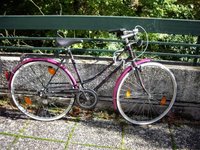It turns out that I might be ....
the weakest link in my household. We were taking a bit of an audit of electricity usage and as it happens, my heater uses *a lot* of our household electricity. I was a bit confronted by this information, as I think of myself as having a relatively light ecological footprint. I am a vegetarian, for crying out loud! I compost, grow stuff, refuse plastic bags, use public transport where possible and never use a clothes dryer. (Please don't get me started on people who use dryers!!). Surely all that counts for something?
But this situation I find myself in has caused me to reflect on how easy it is to become holier than thou on one aspect of our ecological footprint while ignoring other less comfortable areas.I also wonder whether I am perhaps focusing too much on low impact lifestyle changes and too little on the areas of greatest impact. So I decided to find out for myself which lifestyle choices can make the biggest difference to the environment. Thanks to the World Wildlife Fund online calculator, I have been informed that I am indeed a big foot - I'm using the equivalent of 1.7 planets or almost double my share. The average Australian uses the equivalent of 3 planets.
 |
| My ecological footprint results |
So, what else did I discover? One of my biggest areas of impact is food. Initially I was surprised. A UN study entitled "
Livestock's Long Shadow", indicates that eating meat is the number one consumer cause of global warming, above all types of transport combined. And according to the "What if" section below, if every Australian reduced the amount of animal products they consumed, we could reduce our ecological footprint by
18 million hectares! Yet, food is one of my biggest percentage items. I guess even a vegetarian diet takes a lot of agricultural land. Apart from going vegan or just eating less, which is probably not a bad idea, I can reduce the amount of packaged and imported foods that I consume. If Australians were to reduce the amount of packaging they use, we could reduce our footprint by
14 million global hectares!
My other big area was services. It seems that I am at the same time good (high use of public transport and recycling services), bad (high use of waste services, packaging, and possibly transport related to imported food) and confused (high electricity usage - but if it's renewable is it okay to use more?) which makes it hard to assess whether having a high percentage on the services slice of the pie is a good thing or not. However, given that the amount of land I use for energy is so high, that is one area I can definitely improve upon. If more Australians reduced their electricity usage through more efficient appliances, we could reduce our footprint by
2 million global hectares. If more Australians had solar panels (thereby reducing their *bad* electricity usage down to zero) we could reduce our footprint by
9 million global hectares.
Interestingly, although I travel by plane a lot for work, mobility was not my worst area. The fact that I mainly travel in Sydney by foot, bike, and bus apparently compensates for all the flying I do. Apparently if the average Australian reduced their car usage and increased their use of public transport, we could reduce our footprint by
9 million global hectares. Flights do contribute to
1 million of Australia's global hectares, however, so it's something I need to think seriously about.
Shelter was my smallest slice of the pie, possibly due to the fact that I live in a modest sized house with four others. We can share things that take up a lot of energy like a fridge and also be part of a food co-op. Interestingly, there were not any questions about how many children I have and whether the people I lived with were the result of my own procreation or somebody else's. I felt that should have been asked. An article entitled "
The 5 most important things you can do for the environment" lists having fewer or no children as the number one thing we can do. While I take off my hat to those who choose not to have children for the sake of the environment, it's nice to know that my situation (childless, as one friend so delicately put it) lightens my impact somewhat. I'd like to know how many global hectares I'm saving through this sacrifice on everyone else's behalf!!
 |
| Interesting to note which areas can have the biggest impact |
So while I'm still the weakest link, I probably won't be voted out of the house. They are a very reasonable bunch! But there's plenty of room for improvement. One day I might just have a job where I travel less, reduce my waste and packaging even more, eat vegan and local, and yes, be warm in winter because of my amazingly insulated green house that is heated using passive solar and boosted by as much solar energy to power that heater as I care to use! Ahhh! But until then, I plan to rug up, or take the advice of the student residence in Switzerland when the heating system broke down - go hug a flatmate!





























